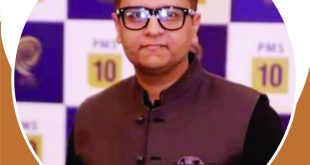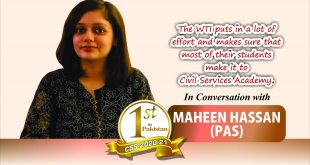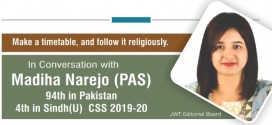“Choosing an optional subject according to your aptitude and your background is the key to success.”
Jahangir’s World Times (JWT): First of all, please tell us about your educational background?
Khawaja Muhammad Umair Mehmood (KMUM): I graduated from Lahore University of Management Sciences (LUMS) with a major in Economics and minors in Finance and Mathematics. Prior to this, I have studied at Chand Bagh School, Muridke and Lawrence College, Ghora Gali.
JWT: How much helpful did you find Jahangir’s World Times (JWT) in your preparation for PMS exam?
KMUM: JWT magazine is quite a beneficial source for the Current Affairs as it provides know-how of the present-day developments happening across the globe.
JWT: What, in your opinion, is the key to getting through compulsory papers of PMS exam, especially that of General Knowledge?
KMUM: There are no hard-and-fast rules to get through the compulsory papers of PMS exam; it all depends upon what approach one adopts. For me, it was mainly covering all the bases so as to equip myself with the right kind of tools to deal with any sort of question I may face in the exam. Go through the syllabus, make a detailed plan covering everything, set short targets and ensure you achieve them before you go to bed.
For General Knowledge paper, there is no fixed syllabus so the job becomes a bit difficult. One can know the trend of the questions by going through past papers, jotting down the questions asked in those, and covering similar styled questions. The key is to acquaint yourself with as much knowledge as you can, but, at the same time, not overburdening your mind.
JWT: How answers should be written to get maximum marks in the written part of PMS exam?
KMUM: It depends on the question asked; some questions are facts-based, some are opinion-based and some where you have to narrate something. The key is to justify what you write and not merely fill in pages. If the answer is clear, concise and fulfils the query asked, even if it is short, it will hit the nail on the head and fetch you maximum marks. One should, however, avoid the approach of cramming answers as that way, we write something else whereas the examiner is interested in asking something different and thus, aspirants fall prey to this rote learning.
 JWT: How did you structure your Essay?
JWT: How did you structure your Essay?
KMUM: The topic I chose was a reflective one. Of course, it is the introduction and even more so the outline which sets the tone of your essay. But it would be naïve to think that the main body and the conclusion carry less importance. After introducing the topic and taking a stance, I provided examples and reasons to justify my arguments.
JWT: What was your strategy for the General Knowledge paper?
KMUM: For the GK paper, I first analyzed the syllabus and the past papers so as to decipher the trend of questions. Later, I jotted down the important areas covered in the past few years’ papers and thus, started preparing for those topics first. During my preparation, I consulted a General Knowledge book by JWT Publications and also sought help from some online tools.
JWT: Should there be some word limit kept in mind while writing answers?
KMUM: I did not follow any word limit while answering the questions. If you can write your point of view in 4-5 pages, why write 8-9 pages? There may be, though, some questions that require a lengthy answer. However, one should increase one’s writing speed so as to write on all aspects asked in a question.
JWT: Is it better to attempt optional papers in Urdu or one should go with English only?
KMUM: It depends on one’s own preference. But, I would suggest aspirants to choose a medium they feel comfortable in expressing their thoughts. What is important is to clearly communicate what you want to, and not the medium which you choose.
JWT: How one should choose Optional Subjects?
KMUM: Choosing an optional subject according to your aptitude and your background is the key to success. People often fall prey to the ‘scoring subjects’ fallacy and all that. If one does not have aptitude for something, how can one do well in that? So, choose subjects according to your own preferences and aptitude.
JWT: Who deserves the credit for your success?
KMUM: I believe it is my father. He was the one who prodded and also supported me during this adventure. He stood by me like a rock during the highs and lows of this journey. Moreover, I dedicate this to my teachers who helped hone my skills and bring out the best in me during my entire academic career.
JWT: As interviewers usually grill the interview candidates, how did you manage the situation?
KMUM: I had a somewhat different experience to the one that you have mentioned. Yes, they do ask questions and they even pose counter questions also, but I would not regard it as grilling or something like that. I believe it is done to gauge how confident and composed an interviewee is and how well can (s)he justify the statements. I maintained eye contact with the panel, gave to-the-point answers, kept a calm and clear tone, and clarified my stance when posed with a subsidiary question.
My advice for fresh aspirants
Prepare yourself well for the exams. Do not cram stuff, instead, you should focus on attaining the right kind of knowledge that will help you perform better in the exam. Choose the optional subjects wisely keeping in view your academic background and personal preferences. Prepare notes that will be of use to you a day before the exam too, and not just fill up pages that you don’t even have time to study. Moreover, if unfortunately, you do not make it, keep in mind that competitive examinations are not the end of the world. The knowledge you have gathered in the process will prove to be invaluable in the years to come and help in your personal grooming and will, thus, provide you a platform for something even more beneficial for you. So keep your hopes high, but at the same time, do not stagnate your life and constantly try to improve yourself and your surroundings.
My Interview Experience
The interview began with a direction to give my introduction. Later, I was asked a plethora of questions including, but not limited to, the reasons for aspiring to join the civil service, my family background, academic career and professional experiences.
The questions asked ranged from general to very specific. The areas covered included general administration, issues of Punjab and Pakistan and their solutions, differences between a few terms such as management, administration, decentralization, devolution etc. Other questions included hypothetical situations and optional-subjects-related questions.
I tried to give clear and concise answers, while at the same time, used hand gestures and maintained eye contact with the members.
 Jahangir's World Times First Comprehensive Magazine for students/teachers of competitive exams and general readers as well.
Jahangir's World Times First Comprehensive Magazine for students/teachers of competitive exams and general readers as well.




